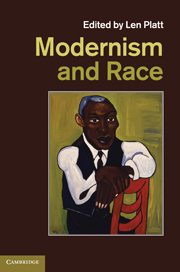Book contents
- Frontmatter
- Contents
- Notes on contributors
- Introduction
- 1 Germanism, the modern and ‘England’ – 1880–1930: a literary overview
- 2 ‘All these fellows are ourselves’: Ford Madox Ford, race and Europe
- 3 ‘’Tis optophone which ontophanes': race, the modern and Irish revivalism
- 4 Generating modernism and New Criticism from antisemitism: Laura Riding and Robert Graves read T. S. Eliot's early poetry
- 5 Race, modernism and the question of late style in Kipling's racial narratives
- 6 Atlantic modernism at the crossing: the migrant labours of Hurston, McKay and the diasporic text
- 7 Claude McKay in Britain: race, sexuality and poetry
- 8 Wyndham Lewis and the modernists: internationalism and race
- 9 ‘Until Hanandhunigan's extermination’: Joyce, China and racialised world histories
- 10 Race, gender and the Holocaust: traumatic modernity, traumatic modernism
- Index
- References
4 - Generating modernism and New Criticism from antisemitism: Laura Riding and Robert Graves read T. S. Eliot's early poetry
Published online by Cambridge University Press: 03 May 2011
- Frontmatter
- Contents
- Notes on contributors
- Introduction
- 1 Germanism, the modern and ‘England’ – 1880–1930: a literary overview
- 2 ‘All these fellows are ourselves’: Ford Madox Ford, race and Europe
- 3 ‘’Tis optophone which ontophanes': race, the modern and Irish revivalism
- 4 Generating modernism and New Criticism from antisemitism: Laura Riding and Robert Graves read T. S. Eliot's early poetry
- 5 Race, modernism and the question of late style in Kipling's racial narratives
- 6 Atlantic modernism at the crossing: the migrant labours of Hurston, McKay and the diasporic text
- 7 Claude McKay in Britain: race, sexuality and poetry
- 8 Wyndham Lewis and the modernists: internationalism and race
- 9 ‘Until Hanandhunigan's extermination’: Joyce, China and racialised world histories
- 10 Race, gender and the Holocaust: traumatic modernity, traumatic modernism
- Index
- References
Summary
The relationship between modernism and antisemitism – both in terms of the attitudes of individual writers and in terms of the ideology of the aesthetic itself – has long been a question in modernist studies, a question increasingly discussed with reference to T. S. Eliot's early works. Contemporary debate about Eliot foregrounds the poem ‘Burbank with a Baedeker: Bleistein with a Cigar’. In a poem about the decline of Venice, what does it mean that ‘The rats are underneath the piles. / The jew is underneath the lot’? Christopher Ricks, Anthony Julius, Rachel Blau DuPlessis, Vincent Sherry and Ronald Schuchard, among others, have all asked similar questions of ‘Burbank’. Is there antisemitism in the poem? If so, is the poem as a whole antisemitic? Whose antisemitism is it – Eliot's, Burbank's, an abstract narrator's? Is it being promoted, is it being undermined, is it simply being inspected? That critics should answer such questions in very different ways is not surprising. What is surprising, however, is that they should all have virtually ignored the first critical discussion of this question by Laura Riding and Robert Graves in A Survey of Modernist Poetry (1927).
Riding and Graves not only ask the same questions but also provide answers that anticipate many of the positions maintained in the debate today. They do so, moreover, in one of literary history's first efforts to define modernist poetry in particular and modernism in general: their attention to the role in modernism of the First World War, Nietzsche's dead god, anti-romantic attitudes, technical experimentation and irony outlines definitions later sanctioned by academics.
- Type
- Chapter
- Information
- Modernism and Race , pp. 77 - 96Publisher: Cambridge University PressPrint publication year: 2011



